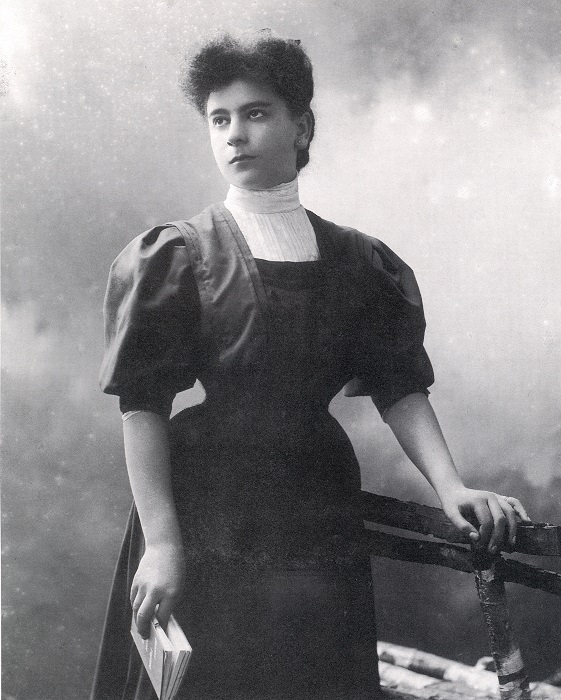Biography of Elody Oblath Stuparich
Elody Oblath was a writer, born in Trieste in 1889 and last of the five children of Samuel Oblath and Virginia Luzzato.
Her father, of Hungarian origin, was a member of a Jewish land-owning family show, aged sixteen, had moved to Trieste, at the time a city of the Austro-Hungarian Empire, in a bid to find his own way in life, approaching the world of business. Her mother came from a large, cultured family, originally from Veneto.
The Oblath family was in a comfortable position and Elody was educated as was typical for young women of good society, attending the protestant German language schools - Trieste was part of the Austro-Hungarian Empire - and thereafter completing her education in a college in Siena, in 1905, to learn Italian, although she would ultimately only stay there one year, as she found it difficult to cope with the rules and the distance from her family. As a young girl, Elody studied music and dance and spent a great deal of time reading.
From 1906 to 1908, Elody made her most important and long-lasting friendships that were to prove essential to her intellectual development and in directing her cultural interests. She strengthened her friendship with Anna Pulitzer (1889-1910), her companion through the protestant schools, and with whom she exchanged many letters. Anna Pulitzer introduced Elody to Luisa Carniel (1887-1969) and Scipio Slataper (1888-1915) and although the four were very different people, they created a literary association, driven by the letters exchanged by them.
Stimulated both on a human and intellectual level, from 1909 to 1913 Elody enhanced her education with new readings of contemporary authors - including the Norwegian playwright and poet H. Ibsen, Slataper’s favourite author - and by studying the classics of German and French literature.
In 1914, she met Giani Stuparich and in 1915, Elody, of Italian sentiment, divided her time between Rome and Florence, coming into contact with some of the most authoritative voices of Italian culture, including Giuseppe Prezzolini, the group of the Vociani, Sibilla Aleramo and many others besides.
The outbreak of the Great War deprived Elody of her much-loved friend Scipio Slataper and of Carlo Stuparich, brother of Giani, whom Elody married in 1919.
The family was blessed by the birth of three children, Giovanna, Giordana and Giancarlo, and this new life in any case allowed Elody to keep her friendships, good readings and writing of her Diaries alive.
Starting from the late 1920s, with Giani’s help, she began revising and collecting together the letters and various writings, with this reorganisation leading her to modify her letters to a sort of “confession” or “diary”, although she never completed the task entirely.
In 1935, she met Maria Chiappelli, writer and friend, to whom Elody entrusted her Diaries, hoping that they would one day be published. Giani, who was busy drafting his own literary works, was much assisted and advised by Elody.
The promulgation of the racial laws in 1938 forced Elody to convert to Catholicism, embarking on a route of mystic maturation that expanded and completed her vocation to introspection, already pursued since a young age. The experience in the Risiera di San Sabba prison in Trieste, the only Nazi camp in Italy, together with her mother and husband, was one of the most dramatic episodes linked to her memories of the Second World War. During the aftermath, to help contribute towards the family needs, Elody found work with the Italian Red Cross and began gradually distancing herself from her husband, with whom, however, she would always enjoy a very good relationship.
She was struck by a severe illness in the mid-1950s, which progressively caused her to become immobile but did not prevent her from collaborating with RAI’s Terzo Programma, as translator of new authors for the German literature section. Elody showed great strength in coping with her illness, driven by a fighting, curious spirit and benefiting from the affection of her family and many friends. These include Carmen Bernt Furlani, “her last friend”, with and for whom in six years of constant correspondence, she re-lived her life story.
Elody Oblath died in Trieste on 06 September 1961.
Works
Notturni di maggio, Trieste 1950
Poesie e notturni di maggio, Trieste 1967
Confessioni e Lettere a Scipio, a cura di Giusy Criscione con una premessa di Giorgio Petrocchi e un ritratto di Sergio Miniussi, Torino 1979
Lettere a Giani, a cura di Giusy Criscione con una introduzione di Gian Marco Antignani e una nota di Giuliano Manacorda, Roma 1994
L'ultima amica: lettere a Carmen Bernt Furlani, a cura di Gabriella Ziani con una presentazione di Mario Isnenghi, Padova 1991
Note autobiografiche e confessioni, a cura di Giusy Criscione Dello Schiavo, Trieste 2014
Selected bibliographical sources
AA.VV., Elody (1889-1971): mostra documentaria, 7-21 dicembre 1996, Trieste 1996
CURCI R., ZIANI G., Bianco, rosa e verde: scrittrici a Trieste fra '800 e '900, Trieste, 1993
External link
Elody Oblath e il Conservatorio di Musica
Publications

